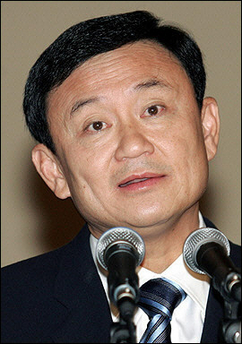Thai Prime Minister Thaksin Shinawatra announced he would step down to
reunite the country, following weeks of mass protests demanding his resignation
and a controversial election which the opposition boycotted.

Thai Prime Minister
Thaksin Shinawatra reacts to a question during a press conference at
Government House in Bangkok. Thaksin announced he would step down to
reunite the country, following weeks of mass protests demanding his
resignation and a controversial election which the opposition
boycotted.[AFP] |
The former telecoms tycoon made
the announcement in a 10-minute televised live statement just hours after
meeting the nation's revered King Bhumibol Adulyadej and after his political
rivals rejected any compromise.
"I will not accept the post of prime minister when the parliament convenes,"
said Thaksin.
"My reason for not accepting the post of prime minister is because this year
in an auspicious year for the king, whose 60th anniversary on the throne is just
60 days away," he said.
"I beg all Thais to sacrifice for the king. I apologize to my 16 million
supporters that I cannot take the post of prime minister."
Thaksin said he would carry on as caretaker until a successor was chosen, and
would remain a member of parliament and leader of the Thai Rak Thai (Thais Love
Thais) party.
He hugged his daughters and wept on their shoulders after the statement.
Protests demanding Thaksin's resignation began in February after his family
made 1.9 billion dollars tax free from selling their shares in Shin Corp., the
telecoms firm he founded before entering politics.
Tens of thousands demonstrated against the sale, alleging corruption and
abuse of power, in near-daily rallies in the capital Bangkok.
A key protest leader declared victory moments after the announcement.
"This is our victory. If we had not helped each other (in the protests),
today would not have happened," Chamlong Srimuang said, although it was unclear
whether the resignation would bring an end to the crisis.
Parliament cannot confirm a new prime minister until all 500 seats are filled
pending by-elections in 39 districts where candidates were either disqualified
or failed to get 20 percent of the vote, promising weeks of further uncertainty.
Chamlong's People's Alliance for Democracy had vowed to launch fresh protests
if Thaksin did not quit, indicating the premier's gamble on early elections had
failed.
"The election has proved his popularity has gone down. His legitimacy was
greatly affected," said Panitan Wattanayagorn, a visiting professor of
international relations at Johns Hopkins University.
Thaksin called the election three years early to head
off the street protests against his rule. However, the opposition boycott
undermined the credibility of the polls and ensured a huge protest vote against
the premier.

Thai Prime Minister
Thaksin Shinawatra waves to cameras after arriving for a cabinet meeting
at the Government House in Bangkok April 5, 2006. Digesting his stunning
promise to quit, opponents of Thaksin tried to work out on Wednesday how
best to ensure the exit of a leader they think is down but not out.
[Reuters] |
The more than 16 million votes he claimed fell a long way short of the 19
million people who gave him a landslide election win just one year earlier.
And an estimated 10 million people cast "no votes" or abstentions including a
majority in Bangkok.
"The result of no-vote ballots, particularly in Bangkok, was a big surprise
to him. It was too high and that could create a major crisis," Panitan said.
The leader of the Mahachon Party, which boycotted the polls, hailed Thaksin's
decision.
"I am glad and I praise him for it. I wanted to hear this for a long time.
Now everything will be solved," Sanan Kachornprasart told Thai television.
But the spokesman for the leading Democrat Party, Ong-art Klampaiboon, said
more needed to be done to heal the political divide.
"It will help the current political deadlock on a certain level, but not
entirely, because the situation has dragged on for some time," he told Thai
television.
The protracted crisis has cast a cloud over one of the region's most dynamic
economies. The government has already adjusted economic growth forecasts and the
stock market has taken a hit.
Business leaders welcomed Thaksin's move.
"Now he can step down with dignity. It's the right decision for the economy
that the uncertainty would be relieved somehow," said Kiatphong Noijaiboon, a
vice chairman of the Federation of Thai Industries.